Airbus celebrates delivery of Delta’s 100th Alabama-built A320 jet
On a Brookley campus dotted with multiple major construction sites, Airbus celebrated a milestone in its relationship with Delta Air Lines on Monday.
Most of the work zones were not directly visible from the spot where company executives and elected officials spoke, and where a few dozen employees gathered to celebrate the delivery of the 100th Alabama-built A320-family jetliner to Delta. But the plentiful evidence that Airbus is building for boom times certainly helped set the mood.
“I’m starting to get really comfortable in Alabama,” said Jeff Knittel, chairman and CEO of Airbus Americas. “I may have to move here. I just read in the Wall Street Journal that this is the place to be.” (That paper recently reported that coastal Alabama’s lower cost of living was tempting people to move there from Florida.)
“Preach it,” responded U.S. Rep. Jerry Carl, who along with Sen. Katie Britt was among those present.
Delta flies more than 400 Airbus aircraft, said Heather Wingate, senior VP of government relations for Delta. If you count a few A220-class jets, which Airbus also assembles in Mobile, more than a quarter of them were manufactured in Mobile.
More are coming. Airbus executives confirmed about a year ago that they planned to build a third Final Assembly Line in Mobile. The new line, like the first, will produce A320-family jets. Demand is high for the single-aisle, twin-engine jet and Airbus aims to ramp up production to unprecedented levels to capitalize. It’s also adding a second line to its A320 FAL in China.
“When you look back on where we were 5-10 years ago, I don’t think anyone could have imagined what we are doing here,” said Knittel. “Where we are today in Mobile? I’ve talked about the growth, but it’s not just growth in facilities, it’s growth in employees. We’ve gone from 50, 100 employees, this site now has 1,600 employees and we’ll have well over 2,000 very soon.”
In comments to reporters after the ceremony, Knittel said he anticipates the addition of 300 or 400 employees “in the coming year” and the eventual addition of 1,000 “over time.”
As might be expected, the occasion was a love-fest between Delta, Airbus and local officials. Knittel said of the latter group that the Mobile site’s growth has “really been a function of a great cooperation, federal, state and local. And quite honestly, in my experience, I have never seen a more aligned, and more importantly helpful, group. It’s not often you get saying what can we do to help. And that happens with this group.”
Knittel said to Delta, “You’re such an amazing partner for us.”
“It’s a very proud moment,” said Wingate. “We hold deep appreciation for our partnership with Airbus.”
Many singled out the Airbus workforce in Mobile.
“I got to walk through and watch you all a couple of months ago and I was blown away,” said Britt.
Carl said that Mobile’s workforce was becoming a selling point for the city. “We sell you every day, in my position,” he said. “We’re talking to other companies, we’re talking about your family, we’re talking about your commitment. We’re talking about our culture. We talk about you, the employees of Airbus and all the workforce in Mobile, because we’re family.”
He told the workers present that they were part of a David and Goliath story, presenting Boeing as the Goliath whose partisans scoffed at the idea of building jets in Mobile. “You’re David. You got the rock,” he said. “Goliath has got a sore chin right now, and we’re just getting started with Goliath. We just got him knocked off his feet a little bit, we’re going to finish him out.”
Mobile Mayor Sandy Stimpson tossed out the possibility that after the expanded facilities begin operation in 2025, Mobile could be churning out 20 jetliners a month. Knittel said that it’s possible, through Airbus’ planning includes some “cushion.”
Within a few years, Knittel said, the Mobile campus will be capable of producing four A220s per month, plus up to eight A320s on the older line plus up to eight more on the new line.
“We are adding capacity around the world to meet the demands of the markets. And as you know the U.S. market is a growing market, and that’s why Mobile is so critical to the future,” Knittel said. “That doesn’t mean we’ll max out the lines. It’s a question of global demand. We’re building in cushion to ensure that we have the ability to meet more customers’ needs. So we’ll see how many airplanes we actually produce. Building production capability is different than actually producing the number of airplanes.”
Knittel cited FlightWorks, the museum and training center built in a partnership between Airbus and the state, as an asset.
“We are educating young people today for the future of aviation and, to be honest, other industries,” Knittel said. “Other states are asking us if they can copy it.”
